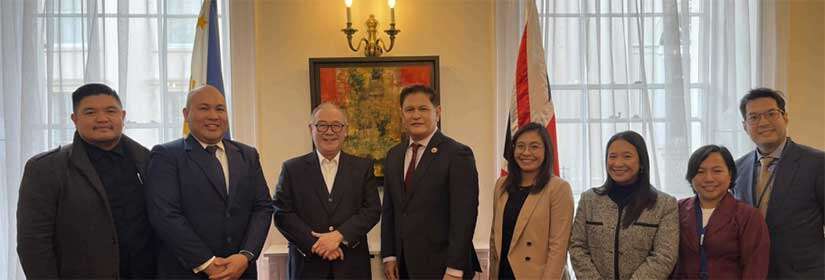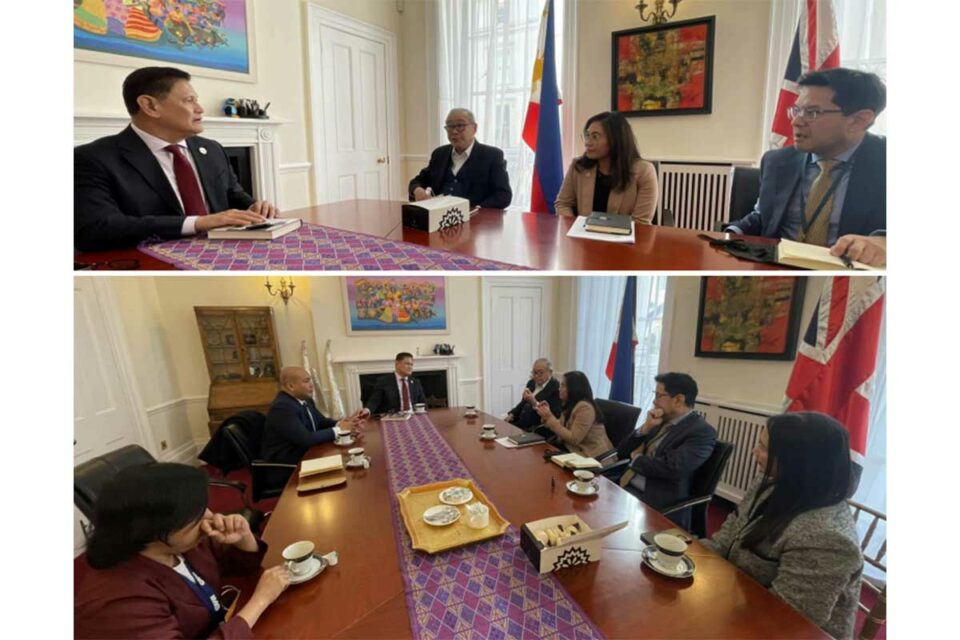UNITED FOR THE RIGHTS OF FILIPINO MIGRANT FISHERS
In a vital meeting at the Philippine Embassy in London, TUCP President and House Deputy Speaker Raymond Democrito C. Mendoza (TUCP Party-list) engaged with influential figures including Philippine Ambassador to the UK, Teodoro “Teddy Boy” Lopez Locsin Jr., Deputy Permanent Representative to the International Maritime Organization (IMO) Consul Raphael Hermoso, Maritime Attaché Atty. Sharon Aledo, and Sheila Mae Aguilar, Officer-in-Charge of OWWA London. Alongside them were APSU National Vice President for Operation Atty. Generick Humprey Morales and TUCP Party-list Chief of Staff Archie Ranin.
Addressing Exploitation in the Fishing Sector
The objective of this crucial discussion was to highlight and combat the exploitation that Filipino fishers are facing while london-party/” title=”Sri Lankan Cricketers Celebrate in Style at HC Bogollagama's London Party”>working on UK vessels. The assembly deliberated over improving labor conditions, enhancing protections for workers’ rights, and advocating a just visa framework that respects these individuals’ contributions to the maritime industry.
“Our fellow countrymen are integral to UK’s fishing operations yet often face neglect as overworked, undervalued laborers lacking essential rights,” stated Mendoza emphatically.
The Crisis Faced by Migrant Workers
A report from Financial Times in 2023 revealed that migrant workers make up more than half of the UK’s fishing workforce amounting to approximately 11,000 individuals; Filipinos constitute a significant portion among them. For years now, operators within this sector have exploited loopholes associated with transit visas—initially designed for merchant seafarers—to sidestep established employment regulations thereby stripping migrant fishers of proper labor safeguards.
“This misuse of transit visas has resulted in both verbal and systemic abuse against Filipino fishers; they’re subjected to relentless work hours with minimal compensation while being burdened by heavy recruitment debts which blatantly contravene ILO Convention 188,” Mendoza added with urgency.

A Collective Call for Action
Consistently advocating for improved treatment overseas and at home, TUCP has urged legislation ratifying ILO Convention No. 188 applicable across all fisheries sectors during multiple sessions of Congress—in particular pushing House Resolution No. 2059 urging swift action from President Ferdinand “Bongbong” Marcos Jr.
Mendoza emphasized further risks many face: “Countless Filipino fishermen endure harsh realities—earning meager wages insufficient even for basic necessities while seeking greater opportunities abroad only exposes them to forced labor scenarios akin to human trafficking.”
Strides Towards Legal Recognition
A recent announcement from the UK Government allows migrant fishers access to Skilled Worker Visas which formally acknowledges their offshore work status while ensuring improved wages along with important benefits such as family reunification opportunities—it is certainly progress made but obstacles linger,” noted Mendoza lamentingly around still high visa costs coupled with challenging English proficiency tests which curtail many affected members gaining access toward these advantages.”
Pushing Toward Respectful Collaboration
The TUCP has been steadfastly propelling discussions surrounding bilateral agreements between both nations aimed at simplifying contract negotiations protecting every working individual irrespective of their legal standing fostering ethical recruitment standards enriching unity between Philippines & UK relations facilitating fair treatment.”
As asserted by Ambassador Locsin alongside initiatives towards understanding concerns raised—especially raising awareness regarding skilled worker recognition—the foundational approach resonates collaboratively throughout governmental departments like Department of Foreign Affairs (DFA) paired alongside Department Migrant Workers (DMW)—working toward achieving effective agreements safeguarding futures aiming directly beneficial growth paths through collective development efforts taking shape together creating real impact on professional setups supporting entire communities depending upon these professions.
Paving The Way For Dignity In Workplaces
Mendoza concluded strongly: “Every ounce exerted—from bloodshed devotion investments risking lives feeding households must recognize fairness within wage structures—but there’s also substantial hope precisely reconcilable pathways manifested here tether through mutual cooperation capturing justice necessary despite lower financial standings amongst workers confronted previously prohibited biases layered deep entrenched before long.”


